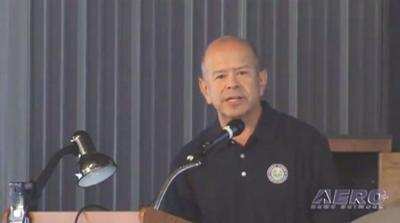Rule Will Significantly Advance Commercial Pilot Training
As part of its ongoing efforts to enhance safety and put the best qualified and trained pilots in the flight decks of U.S. airplanes, the FAA on Tuesday issued a final rule that will significantly advance the way commercial air carrier pilots are trained.

In addition, FAA Administrator Michael Huerta is inviting the nation’s commercial aviation safety leaders to Washington, D.C. on November 21, to discuss additional voluntary steps that can be taken to further boost safety during airline operations, including pilot training.
“Today’s rule is a significant advancement for aviation safety and U.S. pilot training,” said U.S. Transportation Secretary Anthony Foxx. “One of my first meetings as Transportation Secretary was with the Colgan Flight 3407 families, and today, I am proud to announce that with their help, the FAA has now added improved pilot training to its many other efforts to strengthen aviation safety.”
The final rule stems in part from the tragic crash of Colgan Air 3407 in February 2009, and addresses a Congressional mandate in the Airline Safety and Federal Aviation Administration Extension Act of 2010 to ensure enhanced pilot training. Today's rule is one of several rulemakings required by the Act, including the requirements to prevent pilot fatigue that were finalized in December 2011, and the increased qualification requirements for first officers who fly U.S. passenger and cargo planes that were issued in July 2013.
The final rule requires:
- Ground and flight training that enables pilots to prevent and recover from aircraft stalls and upsets. These new training standards will impact future simulator standards as well;
- Air carriers to use data to track remedial training for pilots with performance deficiencies, such as failing a proficiency check or unsatisfactory performance during flight training;
- Training for more effective pilot monitoring;
- Enhanced runway safety procedures; and
- Expanded crosswind training, including training for wind gusts.

"This pivotal rule will give our nation’s pilots the most advanced training available,” said FAA Administrator Michael Huerta (pictured). “While the rule marks a major step toward addressing the greatest known risk areas in pilot training, I’m also calling on the commercial aviation industry to continue to move forward with voluntary initiatives to make air carrier training programs as robust as possible.”
The FAA is focusing on pilot training for events that, although rare, are often catastrophic. Focusing on these events will provide the greatest safety benefit to the flying public. The recent rule to boost pilot qualifications for first officers has raised the baseline knowledge and skill set of pilots entering air carrier operations. Many air carriers have also voluntarily begun developing safety management systems (SMS), which will help air carriers identify and mitigate risks unique to their own operating environments.
The FAA proposed to revise the training rules for pilots in 2009, one month prior to the Colgan Flight 3407 accident. The FAA issued a supplemental proposal on May 20, 2011, to address many of the NTSB’s recommendations resulting from the accident, and incorporate congressional mandates for stick pusher, stall recovery and remedial training. A stick pusher is a safety system that applies downward elevator pressure to prevent an airplane from exceeding a predetermined angle of attack in order to avoid, identify, or assist in the recovery of a stall.
On Aug. 6, 2012, the FAA issued Advisory Circular (AC) Stall and Stick Pusher Training to provide best practices and guidance for training, testing, and checking for pilots to ensure correct and consistent responses to unexpected stall events and stick pusher activations. A copy of the AC is available at online.
Air carriers will have five years to comply with the rule’s new pilot training provisions, which will allow time for the necessary software updates to be made in flight simulation technology. The cost of the rule to the aviation industry is estimated to be $274.1 to $353.7 million. The estimated benefit is nearly double the cost at $689.2 million.
 ANN's Daily Aero-Linx (04.30.25)
ANN's Daily Aero-Linx (04.30.25) ANN FAQ: Turn On Post Notifications
ANN FAQ: Turn On Post Notifications Classic Aero-TV: Agile Aeros Jeff Greason--Disruptive Aerospace Innovations
Classic Aero-TV: Agile Aeros Jeff Greason--Disruptive Aerospace Innovations Aero-News: Quote of the Day (04.30.25)
Aero-News: Quote of the Day (04.30.25) ANN's Daily Aero-Term (04.30.25): Expedite
ANN's Daily Aero-Term (04.30.25): Expedite




